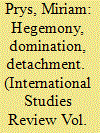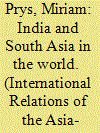|
|
|
Sort Order |
|
|
|
Items / Page
|
|
|
|
|
|
|
| Srl | Item |
| 1 |
ID:
101624


|
|
|
|
|
| Publication |
2010.
|
| Summary/Abstract |
The end of the Cold War has reinvigorated academic interest in the regions of the world, as well as in the regional powers and potential regional hegemons that inhabit them. Yet, what is missing, for regional research to be meaningful and successful, is a well-defined understanding of the variance of regional powers. An anomaly yet to be explained by the existent literature is, for instance, that these states, unlike what might be typical, and expected, for traditional hegemons, do not seem to provide public goods, such as order and stability, nor do they always have an extraordinary impact on the behavior of other states in their region. The driving impulse of this study is, thus, the question of why an 'achievement-expectations gap' can be observed in almost all cases of potential regional hegemons. This article, in specific, then makes the argument that in order to deal with this challenge, we need to move away from the implied assumption about the uniformity of these actors and, rather, that we should begin to deliberately think about the concept of a regional power as a variable that can take on different forms and values. The suggestion of a typology to study these important second-tier states is, therefore, at the heart of this article.
|
|
|
|
|
|
|
|
|
|
|
|
|
|
|
|
| 2 |
ID:
119487


|
|
|
|
|
| Publication |
2013.
|
| Summary/Abstract |
Regions and the regional powers that characterize them stand in multiple inter-relations with the world system. Yet, theories of International Relations struggle with the conceptualization of this global-regional nexus. This article introduces an analytical tool that allows for the evaluation of the 'embeddedness' of regions into the international system and its consequences for a regional power in 'its' region. The theoretical tool shows in particular that regional powers do not necessarily have an inherent interest in 'their' region and its stabilization or, in general, the provision of public goods. Instead, global interests can prevail. Thus, the decision to engage positively in the region is one that does not automatically follow from relative preponderance as it is assumed by many analysts of regional powerhood in the case study chosen here, South Asia, and across the globe. The applicability of this analytical tool is illustrated with the help of two specific examples - India's conflict management in Sri Lanka and its role in the democratization process in Nepal.
|
|
|
|
|
|
|
|
|
|
|
|
|
|
|
|
|
|
|
|
|